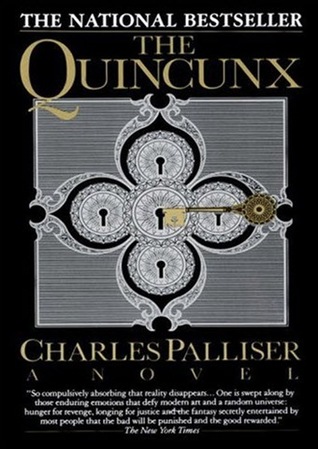 May I introduce you to the book that took me three weeks to read?
May I introduce you to the book that took me three weeks to read?
The Quincunx by Charles Palliser is a hefty doorstop of a book, weighing in at 787 pages in the 1989 edition. It’s big book, almost 3 pounds of paper.
It’s not just big in a physical sense. It’s an ambitious work that was a first novel for Palliser, a bestseller and winner of the Sue Kaufman Prize for First Fiction (source: Wikipedia). The plot is intricate, the settings are naturalistic, and the characters entertaining. This novel is frequently compared to the works of Charles Dickens, and it’s easy to see why.
The main character, who tells most of the story, is John Huffam, a plucky boy who is the hidden heir to a rich estate in the English countryside. A complicated estate entail, a missing will, and a strange codicil to this will have led John’s mother to hide him away in the countryside, living under an assumed name. One day, their home is burgled, disrupting this quiet anonymous life, and setting into motion a series of events that change their lives forever.
John and his mother escape to London after their small fortune is swindled away by their enemies, and they spiral into a life of poverty and ruin in the London slums. After John’s mother passes away, tragically, John must fend for himself. John is frequently an unwitting pawn of his enemies, but sometimes the instigator of plots and plans himself.
The missing will is a central plot point, and John goes undercover at the home of the current estate holder, the Mompessons, working as a scullery boy in order to discover the will’s hiding place. John solves a puzzle – in the shape of a quincunx – and recovers the will. Which is then lost again, through deception.
Another key plot piece is the murder of John’s grandfather. Who actually killed the old man? Was there a plot, or was it just madness?
The novel is wonderfully complex, and can be difficult to follow. About halfway through the novel, I realized that my complete understanding of the plot and what John believes about the plot were not necessary to enjoy the novel. After all, every time I (or John) had the family relationships figured out, or realized who it was that wanted John dead, new information was revealed that made my understanding false. After this happened a few times, I set aside my strong “need to know” and just enjoyed the plot turnings.
Palliser divided this novel into five parts (like a quincunx), each named for a different branch of the intertwined families. With each section, there is a genealogical chart. As the novel progresses, the chart becomes more detailed in each section. It’s a wonderful piece of detail that I really enjoyed, and used to help my developing understanding of the relationships. The maps of London, also included at the beginning of each section, were also interesting and a great reference while reading.
Like Dickens’ novels, The Quincunx features a plucky orphan finding his way, shady London villains, and many happy – or unfortunate – coincidences. And like Dickens’ novel Bleak House, The Quincunx features a will destined for Chancery Court. In my opinion, Palliser has out-Dickens old Boz in this novel. The plot is complicated to the point of absurdity. The villain Barney Digweed makes Bill Sykes look tame, and the put upon and ruined Miss Quilliam, is more desperately used than any Nancy.
So while Palliser has taken these elements so familiar to the novels of Dickens – the orphan, the inheritance, the villains – and taken them to the next level, I don’t think he is fully parodying Dickens. Palliser’s tone is always sincere, even in the pompous omnisciently narrated sections of the novel. Palliser has created a gentle parody, that is more of an homage to Dickens than any kind of satire.
Reading a novel like The Quincunx was a commitment. I am the kind of reader that usually has a few books going at the same time, but to fully appreciate this book I had to suspend that practice for a while and just focus on this novel. I would recommend this very highly to fans of Dickens – and recommend it less so if you are not a fan.

Sue Kaufman ? I cant possibly imagine sitting down to read this thing, let alone writing it.but i admire your perseverance in writing literate reviews in the face of the uncaring void. 😉 cheers, johnny p.
Thanks, Johnny. The uncaring void is exactly what this feels like sometimes. Less so with a fun comment from someone like you. Thanks!